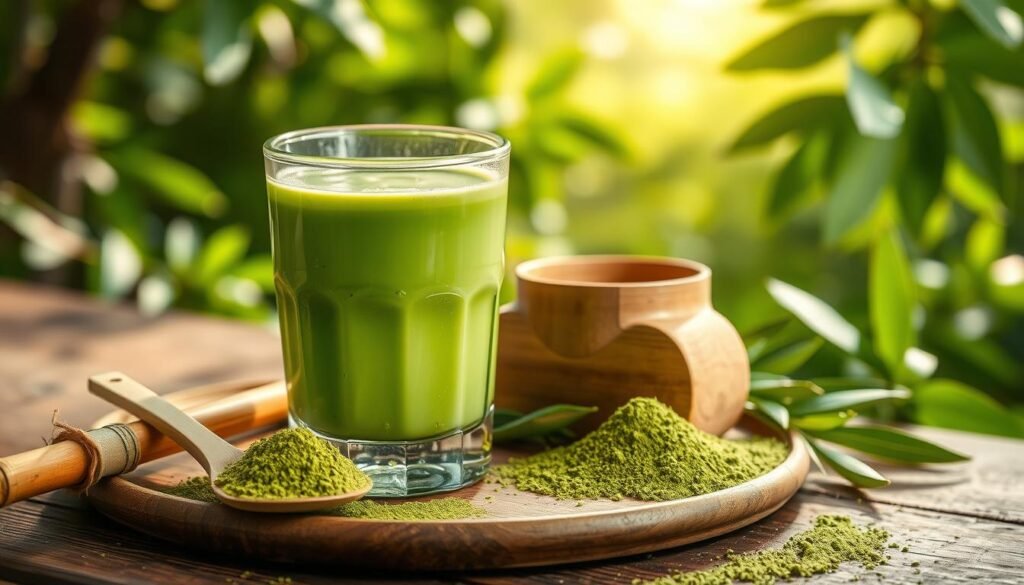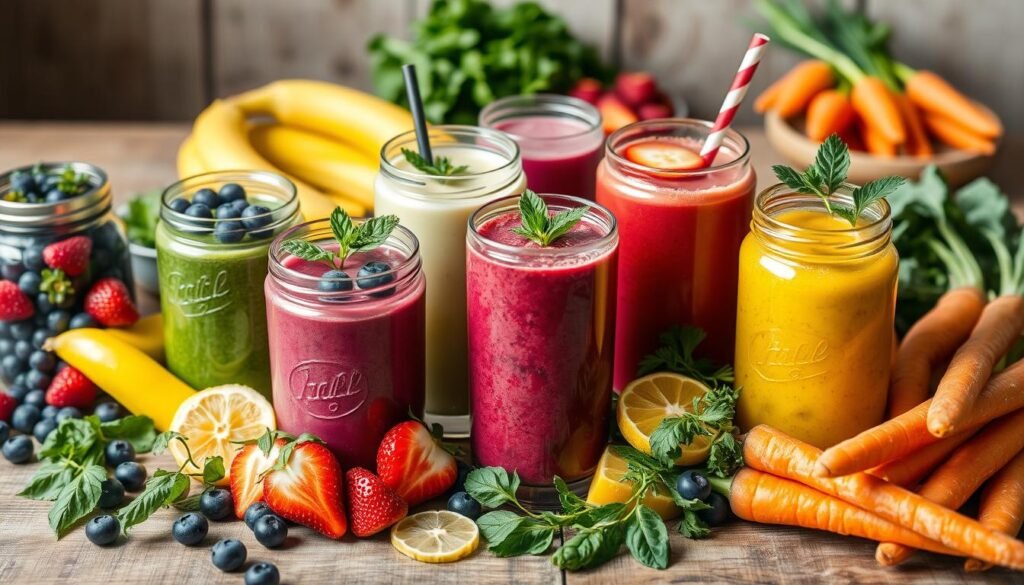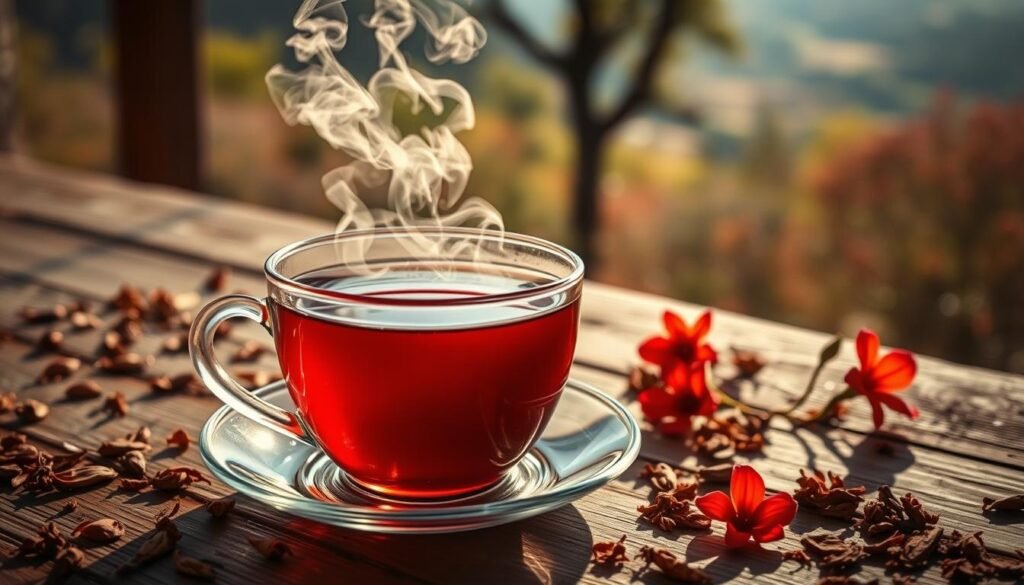Did you know there’s a growing market for non-caffeinated energy drinks? These include herbal extracts and adaptogenic plants. The interest in health and wellness products is climbing. As people aim for healthier lifestyles, they’re looking for alternatives to coffee and tea. The shift to caffeine-free drinks offers healthy choices that meet cravings and boost health.
For those wanting a morning routine without the jitters, trying caffeine-free drinks is a great solution. Chicory root coffee, with its strong taste and gut health perks, is an option. There are also fruit and vegetable smoothies full of nutrients. Herbal teas provide many flavors and wellness benefits, making them popular choices.
In this journey to find alternatives to caffeinated drinks, we aim to understand how they can fit into a healthy life. To learn more about caffeine-free choices, visit this link: learn more about health-conscious beverage choices.
Key Takeaways
- The market for non-caffeinated beverages is on the rise.
- Alternatives like mesquite coffee are nutritious and sustainable.
- Herbal infusions provide diverse tastes and health benefits.
- Chicory coffee offers a coffee-like flavor without caffeine.
- Exploring fruit and vegetable smoothies can enhance one’s diet.
- Reducing caffeine can promote better health and digestive function.
The Growing Need for Coffee Alternatives
As people become more health-conscious, they are trying out different drinks instead of caffeine. This trend is mainly because they want to dodge the negative effects like jitters from too much caffeine. Now, many are seeing the good in choosing drinks that boost energy and focus without the downsides.
Reasons for Reduced Caffeine Intake
More studies are linking caffeine to anxiety issues. Those who react badly to caffeine see their anxiety spike with regular coffee. So, many are cutting back on caffeine for their mental well-being. Knowing if you’re sensitive to caffeine helps you make better choices for your health.
Exploring Non-Caffeinated Options
Nowadays, there’s a bunch of new drinks without caffeine that still taste great. For example, Teeccino has over 35 types that are all about organic, non-GMO ingredients. They taste a lot like coffee but have zero caffeine. Then there’s Rasa, with blends full of adaptogens, and Dandy Blend, which is like a softer coffee. These options aren’t just good in taste; they can also improve digestion and overall health. If you’re curious about how caffeine affects you, check out this article on caffeine anxiety.
Benefits of Non-Caffeinated Drinks
Recently, cutting down on caffeine has become popular for health. People are picking drinks without caffeine instead of regular coffee and tea. These choices can improve how we feel physically and mentally.
Health Benefits of Reducing Caffeine
The Center for Science in the Public Interest says less caffeine can help us relax and sleep better. It can also reduce heartburn. Choosing drinks without caffeine can lower blood pressure too, which is good for our health.
Besides, herbal supplements and lifestyle changes are getting attention for easing anxiety. These non-drug options are easy to add to our daily lives.
Improved Digestive Health
Caffeine can upset our stomachs more than we might think. It often causes acid reflux and heartburn, especially if you’re sensitive. Switching to non-caffeinated drinks can make your digestive system happier.
This change can mean less stomach upset and a better overall digestion. Non-caffeinated options are generally easier on our stomachs.
Alternatives to Caffeinated Beverages
Looking to cut down on caffeine? Trying something like chicory coffee could be a great idea. It gives a rich flavor without the caffeine shakes. Plus, these alternatives match different tastes and health targets.
Chicory Coffee: A Robust Flavor Without Caffeine
Chicory coffee comes from roasted chicory root. It’s a hit for those reducing caffeine because it tastes strong but has no caffeine. You can buy chicory coffee in health food shops or online. It’s easy to get.
How Chicory Root Aids Digestion
Chicory root is not just tasty. It contains inulin, a fiber good for the gut and digestion. If you want a caffeine-free drink that’s also healthy, try chicory coffee. It makes mornings nicer without caffeine’s downsides.
Herbal Tea Substitutes
If you’re looking for something different in your morning drink, herbal tea substitutes are a good pick. They come in flavors like chamomile, mint, and rooibos, giving you healthy drink options. Plus, they’re free from caffeine, so they can fulfill your cravings and boost your health too.
Diverse Flavors for Various Tastes
Herbal teas offer a wide range of flavors to suit everyone’s taste. Some favorites are:
- Chamomile: Known for its calming effects and soothing properties.
- Peppermint: Offers a refreshing taste and may aid digestion.
- Rooibos: Low in tannins and often enjoyed with milk and sugar, making it a comforting alternative.
- Yogi Tea: Offers unique blends like Mexican Sweet Chili, combining organic ingredients for a flavorful experience.
These herbal tea substitutes let you try new tastes while staying caffeine-free.
Health Benefits of Herbal Teas
Adding herbal teas to your daily routine has many health benefits. Chamomile tea can help calm your nerves, while peppermint might improve digestion. Rooibos tea, full of antioxidants, can also improve your health. Many people choose these caffeine-free beverages over traditional caffeinated drinks.
| Herbal Tea Type | Caffeine Content | Key Benefits |
|---|---|---|
| Chamomile | 0 mg | Stress reduction, sleep aid |
| Peppermint | 0 mg | Digestive aid, refreshing flavor |
| Rooibos | 0 mg | Antioxidant rich, low tannin |
| Mud/Wtr Masala Chai | Approximately 1/7 of coffee | A blend of spices, energizing |
Herbal teas perfectly blend taste with wellness benefits. For those eager to try more, lots of unique blends are out there waiting to be discovered.
Energy-Boosting Drinks
Exploring energy-boosting drinks shows us a world filled with natural ingredients. These are made to give lasting energy without caffeine’s jitters. These drinks boost energy and health. They’re a great pick over usual caffeinated drinks.
Natural Ingredients for Sustainable Energy
Natural energy drinks are packed with benefits from healthy ingredients. They include fruits, vegetables, and superfoods for steady energy. You won’t face energy spikes or crashes. Let’s look at some well-loved natural energy boosters:
- Turmeric Latte (Golden Milk): Known for its anti-inflammatory properties and zero caffeine content.
- Yerba Mate: A herbal drink that provides lasting energy with minimal caffeine.
- Mixed Berry Smoothie: Packed with antioxidants and essential minerals, perfect for a morning boost.
- Apple Cider Vinegar Shot: Helps to regulate blood sugar and metabolism for improved energy levels.
- Rooibos Tea: A caffeine-free option loaded with antioxidants.
Incorporating Smoothies into Your Morning Routine
Smoothies are key for a morning energy lift. Adding them to your morning can make you more alert and brighten your mood. Fruits and veggies in smoothies pack a big nutrient punch for lasting energy. Why not try:
- Spinach and Banana Smoothie: Provides iron and potassium for enhanced vitality.
- Mango and Coconut Smoothie: A tropical blend that hydrates and revitalizes.
- Beetroot Smoothie: Known to help improve blood flow and stamina.
| Drink | Caffeine Content | Benefits |
|---|---|---|
| Turmeric Latte | 0 mg | Anti-inflammatory, improves exercise performance |
| Yerba Mate | 80 mg | Long-lasting energy without jitters |
| Rooibos Tea | 0 mg | Rich in antioxidants and minerals |
| Mixed Berry Smoothie | 0 mg | High in antioxidants, natural energy source |
Adding energy-boosting drinks, especially smoothies, to your day improves well-being. They encourage a caffeine-free lifestyle. Focusing on natural drinks boosts both physical and mental health. It’s a full way to manage energy.
Matcha: A Unique Tea Experience
Matcha stands out in the world of healthy drinks. It’s known for its bright green color, rich taste, and health perks. What makes matcha special is it’s made from finely ground green tea leaves. This means you ingest the whole leaf and its nutrients. This offers more antioxidants called catechins, which fight cancer and boost heart health.
Even though matcha has caffeine, around 70 mg per cup, it also has L-theanine. This amino acid creates calmness and sharpens focus. It offers a smooth energy boost that can last 6-8 hours, unlike coffee’s quick high and crash.
Choosing matcha over other caffeinated drinks has many benefits. It improves focus and is a strong detoxifier because of its chlorophyll. Switching to matcha can make your daily routine healthier and more enjoyable.

Golden Milk: The Anti-Inflammatory Powerhouse
Golden milk, also known as turmeric latte, is a comforting drink with roots in Ayurvedic tradition. It’s warm and soothing, perfect for those looking for a caffeine-free drink. It fits well into any part of the day due to its anti-inflammatory benefits.
How to Prepare Golden Milk
It’s easy and rewarding to make golden milk. Here’s a simple recipe for two 12-ounce servings:
- 2 cups of your preferred milk (almond, coconut, or oat milk work well)
- 1 teaspoon of high-quality turmeric powder
- 1/2 teaspoon of ground ginger
- 1/2 teaspoon of ground cinnamon
- 1/4 teaspoon of black pepper
- 1/4 teaspoon of ground cardamom (optional)
- Honey or maple syrup to taste
Heat all ingredients in a saucepan over low heat, whisking until blended and warm. Try adding coconut oil or ghee for more nutrition. You can also enjoy this drink cold for a refreshing feel.
Health Benefits of Its Ingredients
The ingredients in golden milk are key to its health benefits:
| Ingredient | Health Benefits |
|---|---|
| Turmeric | Anti-inflammatory and antioxidant properties, supports overall immune function |
| Black Pepper | Enhances the absorption of turmeric’s curcumin, maximizing health benefits |
| Ginger | Supports digestive health and reduces nausea |
| Cinnamon | Regulates blood sugar levels and has anti-inflammatory properties |
| Cardamom | Promotes digestion and has antioxidant benefits |
Golden milk is more than just tasty; it offers a chance for a comforting routine. Enjoy it with healthy snacks like nuts or whole-grain bread with almond butter. It’s perfect for a cozy evening.
Fruit and Vegetable Smoothies
Smoothies have become a popular way to add essential vitamins and minerals to diets. By mixing fruits and vegetables, people can enjoy tasty drinks that are also nutritious. These smoothies are not just delicious. They are full of antioxidants and micronutrients too.
How Smoothies Provide Nutritional Boosts
Fruit smoothies are full of vitamins C and K. Vegetable smoothies add a lot of dietary fiber. Both kinds are great for health and wellness. Some benefits include:
- Sustained Energy: They offer a steady energy source without caffeine jitters.
- Customized Nutrition: You can make them to meet your own dietary needs.
- Digestive Support: The fiber helps with digestion and gut health.
- Increased Satiety: They keep you feeling full and satisfied for longer.
- Post-Workout Recovery: Great for muscle recovery because they’re nutrient-dense.
Try mixing spinach with banana or pineapple with coconut for great taste. These choices are perfect for starting the day or as a snack. Using different fruits and vegetables boosts flavors and nutrients. This ensures you get plenty of vitamins and antioxidants each day.

| Smoothie Type | Main Ingredients | Key Nutrients |
|---|---|---|
| Fruit Smoothies | Banana, Berries, Spinach | Vitamin C, Potassium, Fiber |
| Vegetable Smoothies | Kale, Carrot, Avocado | Vitamin K, Folate, Healthy Fats |
| Protein Smoothies | Greek Yogurt, Almond Milk, Peanut Butter | Protein, Healthy Fats, Calcium |
Smoothies offer a simple way to eat more fruits and vegetables. With different recipes to try, they can be a fun part of a healthy lifestyle.
Yerba Mate: The Herbal Alternative
Yerba mate is becoming a popular choice for those avoiding regular caffeinated drinks. It offers a special taste and many health perks. With about 80 mg of caffeine per cup, it gives you a gentle energy lift. This means you can say goodbye to the jitters you get from coffee.
Comparative Caffeine Content with Coffee
In places like Argentina and Uruguay, more people choose yerba mate over coffee. It’s not as intense as energy drinks, which have way more caffeine. Yerba mate’s milder caffeine effect boosts stamina without bad side effects. So, it’s perfect for anyone wanting a lighter caffeine option.
Antioxidant Properties of Yerba Mate
Yerba mate is a powerhouse with almost double the antioxidants of green tea. These antioxidants fight off damaging oxidative stress. They also help in managing diseases like diabetes and heart issues.
The special ingredients in yerba mate improve mental focus and physical energy. That’s why top athletes like Antoine Griezmann and Neymar Jr prefer it. It’s a top pick for boosting health and performance.
Rooibos Tea: A South African Delight
Rooibos tea is also known as red tea, but it’s not a true tea. It’s made from the Aspalathus linearis plant, found only in South Africa’s Cederberg region. Being caffeine-free, it’s preferred by those avoiding caffeine.
Rooibos tea is gaining fans for its refreshing taste and as a coffee alternative. People like its sweet, nutty flavor because it doesn’t have tannins. This means it doesn’t leave a dry feeling like other teas.
In South Africa, it’s common to have rooibos tea with milk and sugar. It’s considered a national drink. Each cup offers flavors of honey, spices, and nuts, making it special. It looks deep orange when brewed.
Rooibos tea isn’t just for drinking. Culinary experts use it in food, valuing its unique taste. It’s full of antioxidants, which helps slow down aging. So, it’s tasty and good for your health.

Rooibos tea is loved by many for its blend of taste and health perks. You can drink it warm or use it in recipes. This makes it a great pick for those seeking healthy beverages.
Conclusion
Looking into caffeine-free drink options shows many exciting choices. People wanting to cut down on caffeine find these great. They include chicory coffee and herbal teas. These options match many taste preferences and are good for health. Trying out energizing smoothies is another way to get a boost without caffeine.
Studies suggest moderate caffeine use is mostly safe. But too much can cause issues like poor sleep and stomach troubles. So, people are moving towards caffeine-free drinks. This change boosts overall health. It also lets people find new favorite drinks that fit their lifestyle easily.
Choosing caffeine-free drinks is a step towards better health. It lets people explore other beverage options while keeping what they enjoy. This choice supports a lifestyle focused on being healthy. It allows enjoying different tastes and daily traditions.